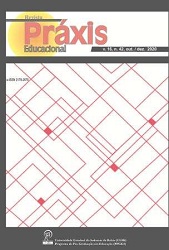CURRICULUM AND TEACHING IN YOUTH AND ADULT EDUCATION IN FLEXIBLE MODE
DOI:
https://doi.org/10.22481/praxisedu.v16i42.7352Keywords:
Curriculum, Adult education, Context, Teaching practiceAbstract
The Youth and Adult Education (EPJA) in Chile, is a modality of the educational system, which gives opportunity to people who have not finished their basic or intermediate studies, and represents approximately one third of the population. This modality has two options, regular and flexible, the first is with schedules and regular attendance given in schools, and the second is flexible and is offered by other institutions. The EPJA historically does not have a relevant presence in the educational system and its teachers face a complex and invisible context. Due to the nature of this modality and its specificity, a qualitative methodology was chosen in this investigation. A case study was chosen; A university institution in the Valparaíso region that offers a flexible modality, a questionnaire was applied to the teachers, revealing categories, and quantitative information was also incorporated that describes the background of the program. The objective of the study was to find out the opinion of the teachers regarding the application and conceptualization of the adult curriculum in this modality. The reflection was made around the concept of curriculum and the proposal is to rethink its application, according to the results referring to questions from teachers, regarding the construction of the curriculum, teaching practice and context. As conclusions, the curriculum does not determine the teacher's practice but it conditions it, the need arises to participate in its construction, and the teachers incorporate the contextualization from their own praxis as a fundamental variable to achieve results in educational practice.
Downloads
Metrics
References
ANGELES SAGASTIZABAL, M. DE LOS (ED.). Aprender y enseñar en contextos complejos: multiculturalidad, diversidad y fragmentación. 1. ed ed. Buenos Aires: Ed. Novedades Educativas, 2009.
CARAZO, P. C. M. El método de estudio de caso: estrategia metodológica de la investigación científica. Pensamiento & Gestión, n. 20, p. 165–193, 2006.
CHILE. Decreto Nº 211, de 30 de agosto de 2009. Modifica decreto N° 131, de 2003, que modificó y fijó el texto refundido del decreto N° 683, de 2000, en la forma que señala, y fija nuevo texto refundido. Santiago de Chile, 30 ago. 2009.
CHILE. Decreto nº 257, de 19 de agosto de 2009. Establece Objetivos Fundamentales y Contenidos Mínimos Obligatorios para la Educación de Adultos y fija normas Generales para su aplicación y deroga decreto supremo nº 239. Santiago de Chile: Ministerio de Educación, 2009.
CHILE. Ley nº 20.370, de 17 de agosto de 2009. Ley General de Educación, Santiago de Chile: Ministerio de Educación, 2009.
MINISTERIO DE EDUCACIÓN. El desarrollo y el estado de la cuestión sobre el aprendizaje y la educación de adultos (AEA). Santiago de Chile: Mineduc, abr. 2008.
MINISTERIO DE EDUCACIÓN. La Coordinadora de la Unidad de Currículum y Evaluación explicó cómo se trabajan las nuevas bases curriculares de tercero y cuarto medio. [S. l.], 25 ago. 2016. Disponível em: https://www.mineduc.cl/la-coordinadora-la-unidad-curriculum-evaluacion-explico-se-trabajan-las-nuevas-bases-curriculares-tercero-cuarto-medio/. Acesso em: 25 maio 2020.
PINAR, W.; GARCÍA GARDUÑO, J. M.; MORA, E. Teoría del currículum. Madrid: Narcea, 2014.
REQUEJO OSORIO, A. La currícula de educación de personas adultas en el estado de las autonomías. In: MARTÍNEZ, M. J. C. (Ed.). Didáctica y educación de personas adultas : una propuesta para el desarrollo curricular. [s.l.] Aljibe, 1997.
SACRISTÁN, J. G. La Función Abierta De La Obra Y Su Contenido. Sinéctica, Revista Electrónica de Educación, n. 34, p. 11–43, 2010.
USHER, R.; BRYANT, I. La educación de adultos como teoría, práctica e investigación: el tríangulo cautivo. Madrid: Fundación Paideia Ediciones Morata, 1992.
Downloads
Published
How to Cite
Issue
Section
License

This work is licensed under a Creative Commons Attribution-ShareAlike 4.0 International License.
You are free to:
Share - copy and redistribute the material in any medium or format; Adapt - remix, transform, and build from the material for any purpose, even commercially. This license is acceptable for Free Cultural Works. The licensor cannot revoke these freedoms as long as you follow the terms of the license.
Under the following terms:
Attribution - You must appropriately give credit, provide a link to the license, and indicate if any changes have been made. You may do so in any reasonable way, but not in a way that suggests that you or your use is endorsed by the licensor.
There are no additional restrictions - You cannot apply legal terms or technological measures that legally restrict others to make any use permitted by the license.










